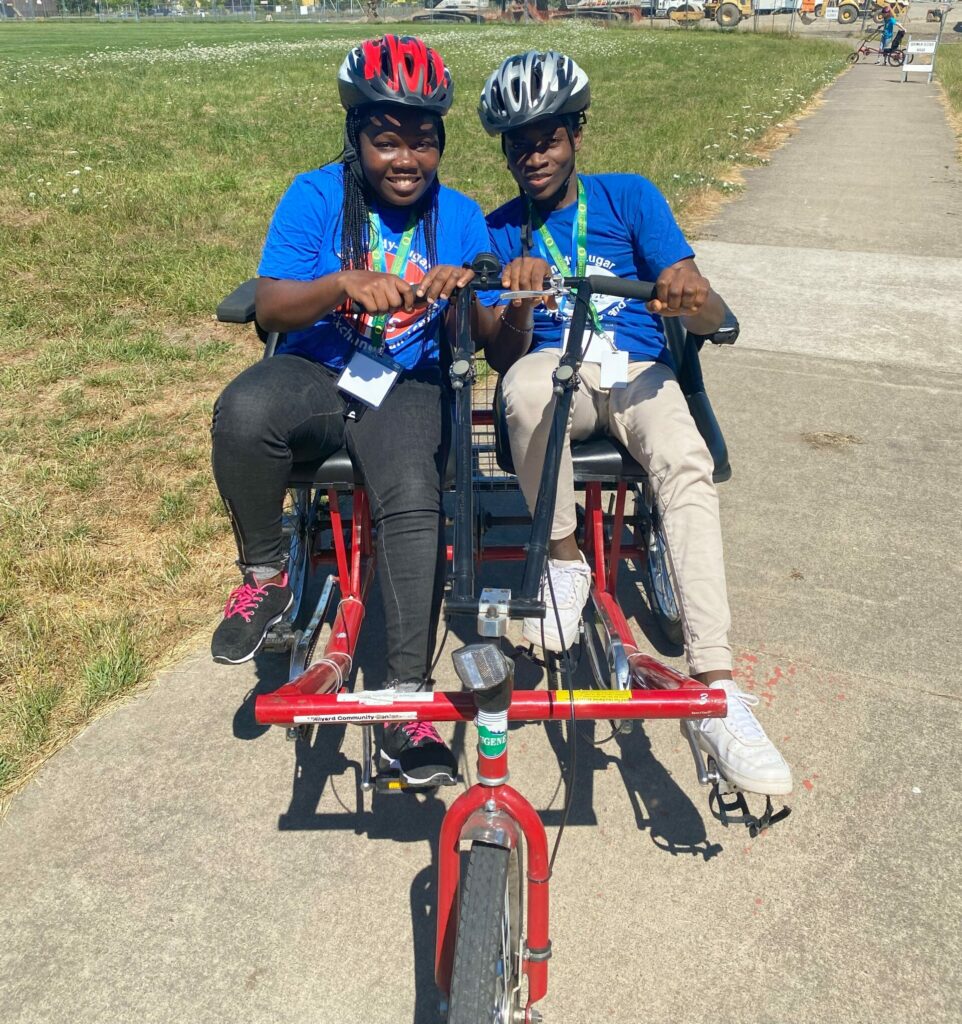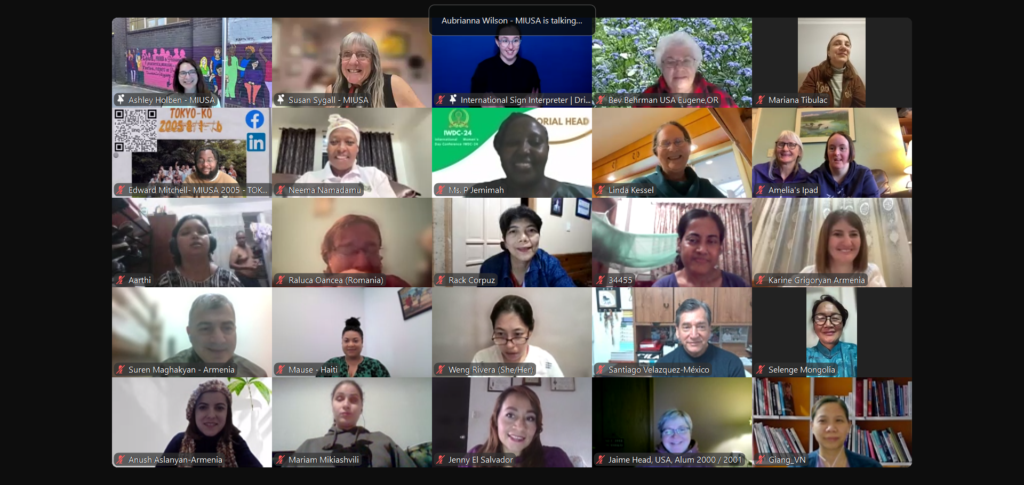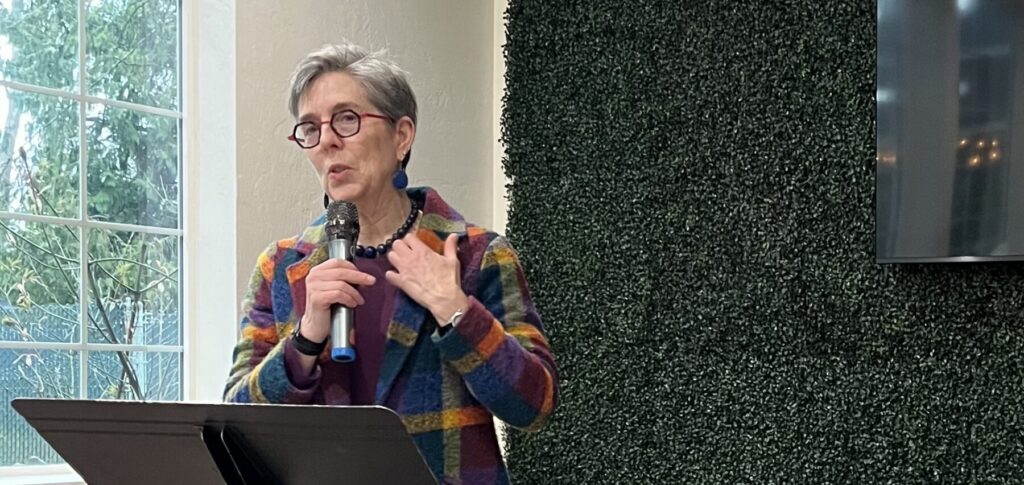Each August, MIUSA welcomes 20+ youth exchange students with disabilities representing the Future Leaders Exchange (FLEX) and Kennedy-Lugar Youth Exchange and Study (YES) to Eugene for a workshop on U.S. disability rights. The MIUSA Preparatory Workshop for FLEX and YES Students with Disabilities is the final stop in their long journeys before heading to their host families, schools, and communities all across the U.S.
As one student reflected, “After the workshop, all of my concerns are gone and I am sure I will be able to have the most amazing exchange year!”
For many of the newly arrived exchange students, this workshop is also their first opportunity to learn practical information about what to expect as a student with a disability in the U.S. Some students have never experienced assistive technology, inclusive parks and community centers, or accessible school buildings. Some have never met another youth with a disability.
FLEX and YES students arrive to Eugene from countries all over the world, including Armenia, Bangladesh, Bulgaria, Georgia, Hungary, Kazakhstan, Kyrgyzstan, Liberia, Moldova, Morocco, Philippines, Poland, Romania, Saudi Arabia Serbia, Sierra Leone, Tanzania, Tajikistan, Turkey, and more. These students boast diverse interests, talents, and skills, as well as different disability types, including students who are blind, low vision, Deaf, hard of hearing, students with physical disabilities, riding wheelchairs, using canes or crutches, and students with non-apparent disabilities or multiple disabilities.
At the MIUSA Preparatory Workshop, these young leaders have the opportunity to explore: What can I expect as a student with a disability in my U.S. school? What accommodations are available that may be useful to me during my exchange year, both in school and in my host community? What are my rights as person with a disability while living in the U.S.?
MIUSA’s Preparatory Workshop uses a blend of classroom-style learning, including sessions about U.S. disability rights laws and types of assistive devices and equipment available in the U.S., and experiential learning, including a full day at the inclusive Spencer Butte Challenge Course, a visit to a local high school, and opportunities to meet community members and try various sports and recreation accessible to people with and without disabilities.
“I learned that there are many opportunities here for people who have disabilities. In the USA, people are equal and there are many accommodations for people who have disabilities.” -2023-24 FLEX/YES Student
“[After the workshop] I know what accommodations I can ask for and what my rights are as a disabled person.” -2024-25 FLEX/YES Student
FLEX and YES students typically arrive in Eugene on an afternoon or evening, eager to begin their adventures in the U.S. After a team effort to secure everyone’s luggage, the group boards a wheelchair-accessible bus and travels to our student housing and workshop venue at the University of Oregon.
One of the first activities of the workshop, before students even know each other’s names, includes volunteering at a local school garden, in partnership with the local nonprofit School Garden Project. While at the garden, students work together to clean out the garden beds, add soil, plant new plants, and add to the compost.

While working in the garden is an opportunity for students to get to know each other while supporting the Eugene community, it also has a deeper purpose. This activity highlights creative ways in which a volunteer activity can be made accessible to people with diverse disabilities, and often sparks conversations about disability access, accommodations, and expectations for equal opportunities and self-advocacy. In addition, this activity reinforces to students that people with disabilities themselves can be in a position to help others and serve their community in a variety of ways.
All FLEX and YES students are required to volunteer in their host communities throughout their exchange year. If a volunteer opportunity is not accessible, how can students advocate for accommodations to make the activity inclusive? Who can they turn to for support or for creative problem solving? This activity is the first of many opportunities for students to start thinking about answers to these questions.
Later in the day, MIUSA leads a session on U.S. Disability Rights, introducing students to two laws that will impact their experience in the U.S.: the Americans with Disabilities Act (ADA) and the Individuals with Disabilities Education Act (IDEA). A lesson on rights-based vocabulary and a brief history lesson, featuring a video of a demonstration by disability rights activists at the U.S. Capitol Building, leads to a discussion in which students may share their perspectives on disability identities, rights, and experiences in their home countries.
“I learned more things about the history of people with disabilities and about their rights. Especially here in the United States, I think it will be helpful in the future with different situations in which we should speak out to have accommodations.” – 2023-24 FLEX/YES Student
Another impactful activity is what MIUSA calls “Gadget Night,” an evening filled with hands-on learning about various assistive devices including mobility equipment, magnifiers, screen reader technology, live captioning, speech to text apps, and more – all with the goal of exploring technology that may be useful for students to make the most of their U.S. experience.

During one of these Gadget Nights, a student with low vision was excited to try drawing using a magnifier, while another student with a physical disability who walks with crutches enjoyed the freedom to move faster and further using a sport wheelchair.
“I learned that USA is more organized to help people with disabilities not to feel left out or pushed away from the communities, even more, they have a right to get proper accommodations that will help them to do everything easily.” -2023-24 FLEX/YES Student
“I learned that there are a lot of wheelchairs for different things like for hiking or ones that float, so the hiking one will be really useful. […] I love everything about hiking and being around nature, but I never thought it was possible for someone like me.” -2024-25 FLEX/YES Student
Most years, students will challenge themselves and each other at the Spencer Butte Challenge Course, where they gain insights into leadership, communication, and cross-disability teamwork, and challenge their preconceptions of what their peers with diverse disabilities can accomplish. Most importantly, students have the opportunity to build their own confidence and sense of empowerment by accomplishing something new and challenging, whether that is scaling a tree for the first time, or finding common ground with someone expressing ideas that conflict with their own. Students practice problem-solving and advocating for themselves – whether sharing an idea with the group, finding a creative way to accomplish a task, or asking for support during the climb.

“The challenge course was very interesting because I learned what “challenge by choice” is. We learned how to work together and I think that the skills developed in these activities related to challenges will help me in my year here.” -2023-24 FLEX/YES Student
Another key activity of the Preparatory Workshop is a visit to a local high school to meet current students and tour the campus. As they navigate long hallways, sit at desks in crowded classrooms, and pass around hefty textbooks, the FLEX and YES students begin to consider some of the accommodations and support they might need to address access challenges in their host schools. Would they be able to choose seats in front to better hear the teacher? Who could show them where to find Braille room numbers on classroom doors? Could they request early dismissal as an accommodation to avoid crowded passages and move safely to their next class?
FLEX and YES students are also typically excited to meet and hear from their U.S. counterparts about the range of extracurricular options available to all students, including sports, clubs, arts programs, and leadership opportunities, as well as the variety of subjects that students can choose in U.S. high schools.

MIUSA’s workshop would not be complete without the inclusive sports session in partnership with the Eugene YMCA and the City of Eugene’s Hilyard Community Center. In the span of just a few hours, students compete in a game of wheelchair rugby or basketball, ride diverse types of adaptive cycles, and try out accessible workout equipment in the fitness center. This, of course, is a highlight for many students who are looking forward to playing sports while in the U.S.!
As with all of the activities in MIUSA’s workshop, the “fun and games” also play an important role in preparing students for the year ahead by introducing students to inclusive recreation opportunities. One student shared the impact of experiencing modified equipment in the fitness center:
“I learned that I could have equipment in the gym to get more grip on my hand. Since I have a gym in my host family house, I really thought about using it after today.” -2023-24 FLEX/YES Student
“It’s been very long since I had been on a bicycle […] It made me very happy. I’ve always been afraid of wheelchairs because I thought being on one would limit me, but after sitting and playing on sports wheelchairs, I found out that it is so much fun and a person [using a wheelchair] can do everything a person who doesn’t use a wheelchair can do. If needed we can always ask for help.” -2024-25 FLEX/YES Student
Not only do students learn about sports and equipment that may benefit them individually, but these activities also give them an opportunity to try out things that might benefit someone with a different type of disability than their own, preparing students to perhaps advocate more broadly for access cross-disability.

After only five days, students form new friendships with their peers from around the world, and leave Eugene better prepared for their upcoming exchange year. They will take with them not only the memories of climbing trees, playing rugby, and planting in a garden, but also the knowledge of their rights as a student and person with a disability in the U.S. and the tools to advocate for the accommodations they need to have the year they’ve imagined for themselves.
“I got to face some of the challenging situations I expected and some I didn’t expect. I feel like I’m more ready for facing those situations in my host high school.” -2023-24 FLEX/YES Student
“[The workshop] was amazing. I found friends with similar disability, became more self-confident, and [learned] something new.” -2024-25 FLEX/YES Student
MIUSA is proud to be one of the first U.S. experiences in what will surely be an unforgettable exchange year for these young leaders! We envision an increase in the number of students with disabilities applying each year for these prestigious scholarships. We wish all students a year of success, health, happiness, and trying new things, and encourage students to share their experience and support their peers with disabilities to apply for future FLEX and YES programs!
Sign up for our E-News






Manage Your Privacy